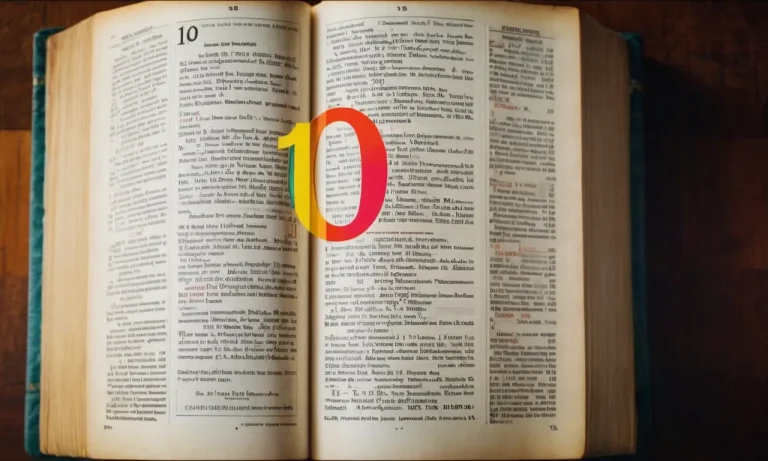What Does The Bible Say About Unforgiveness?
Unforgiveness can eat away at us and damage our relationships. If you’ve ever struggled to forgive someone who hurt you, you’re not alone. The Bible has a lot to say about the importance of forgiveness and the dangers of holding on to bitterness and resentment.
In short, the Bible makes it clear that forgiveness is essential for following Jesus, freeing ourselves from bitterness, and living in peace. God calls us to choose forgiveness even when it’s difficult.
In this comprehensive article, we’ll explore numerous Bible verses about unforgiveness and summarize key teachings that address questions like…
What Does the Bible Say About the Importance of Forgiveness?
Forgiveness brings freedom and peace
The Bible teaches that forgiveness is vitally important for several reasons. First, forgiveness brings freedom from bitterness, anger and resentment. Holding onto grudges and unwillingness to forgive traps us in negativity and robs us of peace.
As Ephesians 4:31-32 says, “Get rid of all bitterness, rage and anger, brawling and slander, along with every form of malice. Be kind and compassionate to one another, forgiving each other, just as in Christ God forgave you.” Forgiveness allows us to let go of pain and live in freedom.
Unforgiveness gives the devil a foothold
Second, refusing to forgive gives the devil a foothold in our lives. In 2 Corinthians 2:10-11, Paul warns, “Anyone you forgive, I also forgive. And what I have forgiven—if there was anything to forgive—I have forgiven in the sight of Christ for your sake, in order that Satan might not outwit us.
For we are not unaware of his schemes.” Holding onto unforgiveness partners us with the devil and his destructive work.
We are called to forgive as God forgave us
Finally, forgiveness is the very heartbeat of the gospel. We can only receive God’s lavish forgiveness by choosing to forgive others. Colossians 3:13 says, “Bear with each other and forgive one another if any of you has a grievance against someone. Forgive as the Lord forgave you.”
Because we have been completely forgiven by Christ’s sacrifice, we can extend that same grace to others. As Jesus taught in the Lord’s Prayer, we ask God to “forgive us our debts, as we also have forgiven our debtors” (Matthew 6:12).
Forgiveness brings freedom, shuts the door to the enemy, and reflects Christ’s redeeming love.
Bible Verses on the Dangers of Unforgiveness
Unforgiveness leads to bitterness
Holding onto bitterness and anger can fill our hearts in an unhealthy way. As Ephesians 4:31 explains, we are to “Get rid of all bitterness, rage and anger”. If left unchecked, these powerful emotions often escalate into deep-rooted resentment, hostility towards others, and chronic unforgiveness.
This bitterness can affect both our physical and spiritual wellbeing. Medically, chronic anger raises risks for conditions like high blood pressure, heart disease, and stroke. Spiritually, bitterness crowds out positive virtues like love, joy and peace that God desires for us (Galatians 5:22-23).
Unforgiveness blocks our prayers
Jesus teaches us to pray “forgive us our debts, as we also have forgiven our debtors” (Matthew 6:12). This verse connects God’s forgiveness of us with our willingness to forgive others. Several other passages, like Matthew 6:14-15, show that refusing to forgive can hinder relationships with both God and others:
| 64% | of American Christians say they struggle with unforgiveness, according to the YouGov 2015 poll. |
As painful memories resurface, we may feel we have a valid excuse to harbor bitterness. But Scripture exhorts us to instead “be kind and compassionate to one another, forgiving each other, just as in Christ God forgave you” (Ephesians 4:32).
Thankfully, as we release others and ask God to soften our hearts, burdens of unforgiveness lift.
Holding grudges harms us more than others
Although bitterness feels justified at times, hanging onto it often hurts us more than those we refuse to forgive. As philosopher Francis Bacon said, “in taking revenge, a man is but even with his enemy; but in passing it over, he is superior.”
Choosing to forgive can feel unfair or weak in moments. But it is an act of strength that sets us free. As Romans 12:17-19 reminds us, we overcome evil with good when we respect others and leave room for God’s wrath, not our own.
We all have blind spots when it comes to seeing past hurts clearly. But if God so freely forgives our sins, how much more should we forgive others? Though it may require sobering self-reflection first, the courageous act of forgiving others allows divine healing to unfold.
How to Practice Biblical Forgiveness
Pray for the strength and grace to forgive
Forgiveness can be extremely difficult, especially when someone has hurt us deeply. But as Christians, we are called to forgive others just as God has forgiven us (Ephesians 4:32). To help us forgive, we can pray and ask God to soften our hearts and give us the grace to let go of bitterness.
Praying for the one who hurt us can also change our perspective. We may even come to see them as God sees them – a precious soul in need of His redemptive love.
Remember Christ’s forgiveness toward us
When harboring unforgiveness, it helps to remember how much we have been forgiven by Christ. Jesus willingly endured the cross to pay for our sins, even though we didn’t deserve it. As 1 John 4:10 says, “This is love: not that we loved God, but that he loved us and sent his Son as an atoning sacrifice for our sins.”
Meditating on God’s lavish grace toward us can melt away the hardness in our hearts. It’s much easier to extend forgiveness when we remember how forgiven we are.
Let go and leave judgment to God
Forgiveness doesn’t necessarily mean instant reconciliation. We may need to let go of a toxic relationship for a time. But with prayer, we can surrender our right to get even and ask God to deal with the offense.
Romans 12:19 says “Do not take revenge, my dear friends, but leave room for God’s wrath, for it is written: ‘It is mine to avenge; I will repay,’ says the Lord.” When we let go and trust God with the outcome, we experience freedom from bitterness.
One day, He will make all wrongs right in a just and perfect way.
Conclusion
As difficult as forgiveness can be, the Bible urges us to choose it again and again. While trusting God to heal our wounds, we must release others from condemnation and pave the way for reconciliation.
Though forgiveness is a journey, each small act of letting go brings us closer to peace and freedom.








